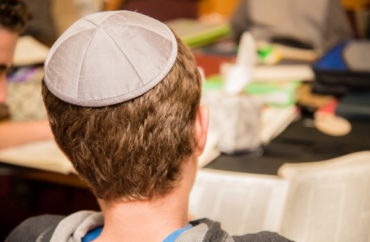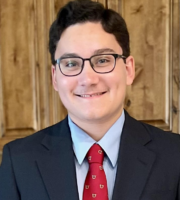
Federal complaint details harassment, ‘pro-Hamas rallies’
The University of California Berkeley stands accused of not doing enough to protect Jewish students on campus – but the school says it implemented many of the measures asked for in the federal lawsuit.
The lawsuit, filed by the Louis D. Brandeis Center for Human Rights Under Law, says the campus “has erupted in on-campus displays of hatred, harassment, and physical violence against Jews,” since Hamas attacked Israel on Oct. 7.
“Court intervention is now needed to protect students and faculty and to end this anti-Semitic discrimination and harassment, which violates University policy, federal civil rights laws, and the U.S. Constitution,” the lawsuit stated.
The university has requested more time to file its response and has not submitted a response as of Jan. 24.
Instances of antisemitism perpetrated on the campus by students include physically assaulting an undergraduate Jewish student at a Hamas celebration rally, “disrupting” a prayer group of Jewish students, and pro-Palestinian events that make Jewish students feel threatened, according to the lawsuit.
“Jewish students have reported being afraid to go to class, which would require them to pass through the pro-Hamas rallies taking place in Berkeley’s main thoroughfare,” the lawsuit stated.
The lawsuit also lists a policy, adopted by some student organizations, to not host speakers that support Zionism, or the idea of a Jewish political state.
The College Fix asked the Brandeis Center how it would respond to the argument that student organizations should be free to invite speakers whom they want.
“The groups are not banning persons based on what they plan to speak about, or their political opinions,” L. Rachel Lerman, the group’s vice chair and general counsel, told The Fix via email. “The ‘Zionists’ are not banned because they will be speaking about Israel or Palestine. They could be speaking on anything at all, but they are banned from these groups because they are ‘Zionists’–persons who believe that Israel has a right to exist as a Jewish State.”
Zionism is linked directly to Jewish identity, Lerman said. “The groups are thus banning persons based on their Jewish identity,” she told The Fix.
Lerman said her group has had victories in the past.
“Our filings with the Office for Civil Rights (OCR) in the Department of Education have led to investigations of the schools in question, and to settlements between the schools and OCR that require schools to take affirmative steps to correct anti-Semitism on their campuses,” Lerman said. “We have also had success in court.”
UC Berkeley told The Fix it condemns antisemitism and has implemented the suggestions demanded by the lawsuit. “Ironically, all of those proposed ‘remedies’ are already in place, and closely adhered to, on the campus,” the spokesman said.
MORE: NYU suspends professor who denied Hamas beheaded babies, raped women
The university also noted it cannot stop anti-Israel gatherings without violating the law.
Assistant Vice Chancellor for Communications Dan Mogulof told The Fix via email:
While we appreciate the concerns expressed by the Brandeis Center, UC Berkeley believes the claims made in the lawsuit are not consistent with the First Amendment of the Constitution, or with the facts of what is actually happening on our campus The university has long been committed to confronting antisemitism, and to supporting the needs and interests of its Jewish students, faculty, and staff.
“That commitment was strengthened in 2015, when the university established the Chancellor’s Committee on Jewish Student Life, and again in 2019 when a groundbreaking Antisemitism Education Initiative was launched on the campus,” he stated.
“As a public university, Berkeley does not have the legal right to stop demonstrations or expression that many would consider to be offensive,” he stated. “Those demonstrations and expression are protected by the Constitution of the United States.”
He said the university sympathizes with students and offers counseling and other “academic adjustments” for students.
He shared two statements that detail what the university has done to address antisemitism and linked to other comments from Chancellor Carol Christ.
The university also tells students to report harassment for further investigation.
Mogulof also shared a statement from Berkeley law school Dean Erwin Chemerinsky, who is referenced in the lawsuit. He has criticized the antisemitism on college campuses.
Chemerinsky stated:
Berkeley Law is dedicated and works very hard to provide a conducive learning environment for our Jewish and all of our students. The complaint filed by the Brandeis Center paints a picture of the Law School that is stunningly inaccurate and that ignores the First Amendment. For example, student organizations have the First Amendment right to choose their speakers, including based on their viewpoint. Although there is much that the campus can and does do to create an inclusive learning environment, it cannot stop speech even if it is offensive.
He said the police department is investigating the “single report of alleged violence,” a Jewish student hit with a water bottle.
The university reiterated it cannot “be compelled to invite speakers they do not wish to” and “would not and could not, for example, compel a Jewish student group to invite anti-Zionist speakers to their gatherings.”
Free speech attorney shares what universities can and cannot do when it comes to hostility and campus gatherings
A similar view was shared by Zachary Greenberg with the Foundation for Individual Rights and Expression.
“Student groups…have their own freedom of association,” Greenberg, an attorney for the free speech group, told The Fix via a phone interview.
Greenberg also commented on how universities can balance free speech rights and complaints about hostility on campus.
It comes down to “who is creating the policy, who is creating the rule,” Greenberg said. Universities “have to ensure that their educational opportunities are open to everybody on an equal basis,” the attorney said.
“But student groups themselves…can have these rules, they can have these restrictions,” he said.
“Student groups have their own First Amendment rights,” he said.
Universities can address tensions on campus while still respecting free speech, Greenberg said.
Most universities have “clear rules” about harassment, threats, and disruption. FIRE wants universities to “apply these rules in a neutral manner.” But they cannot punish students for “protesting” or “expressing their ideas.”
“On the other hand if universities ignore disruptions and threats and intimidation…they’ll only encourage more violence and more misconduct.”
MORE: Professor accused of antisemitism leaves GWU for Qatar
IMAGE: Jyurinko/Shutterstock
Like The College Fix on Facebook / Follow us on Twitter






Please join the conversation about our stories on Facebook, Twitter, Instagram, Reddit, MeWe, Rumble, Gab, Minds and Gettr.